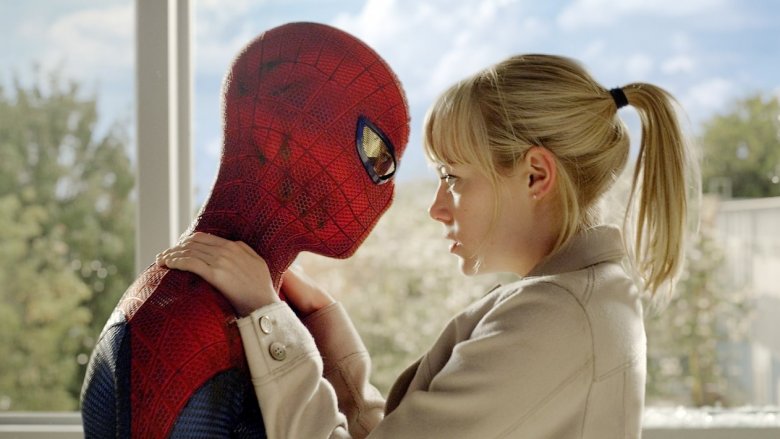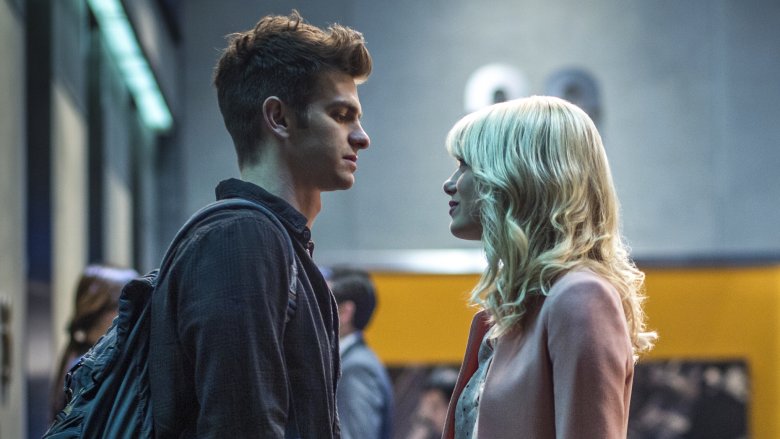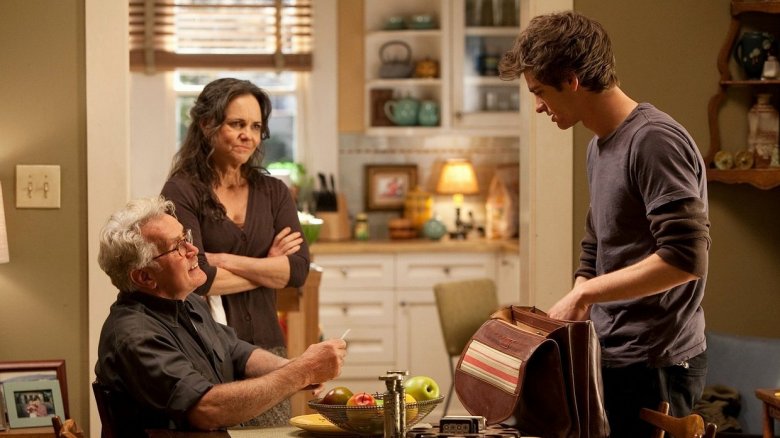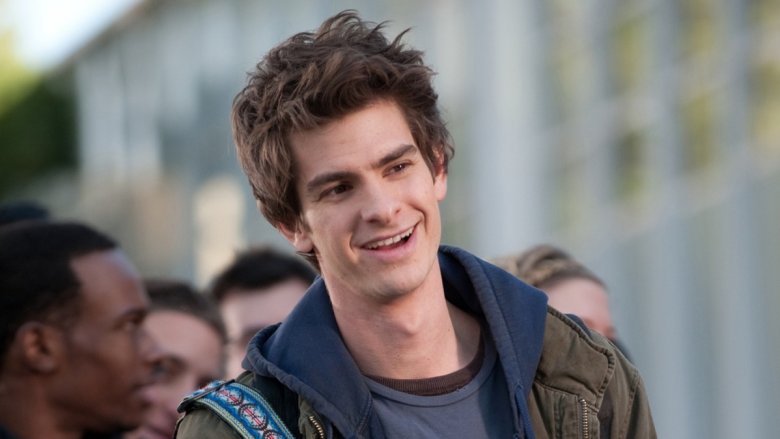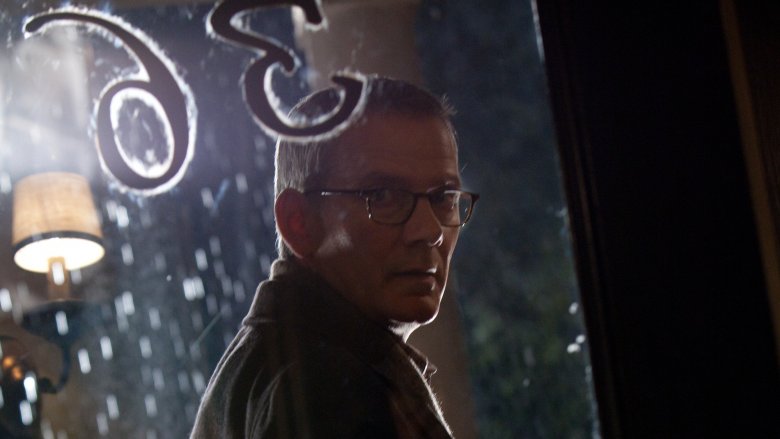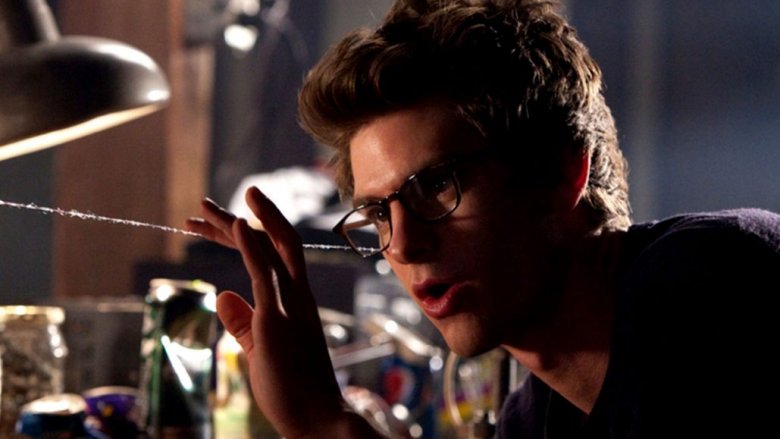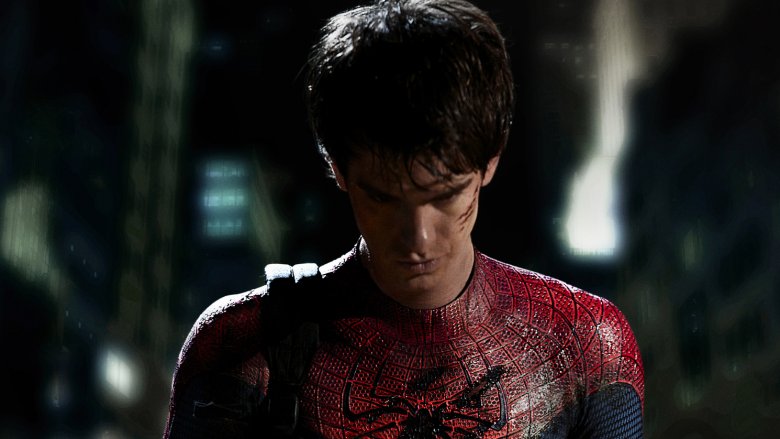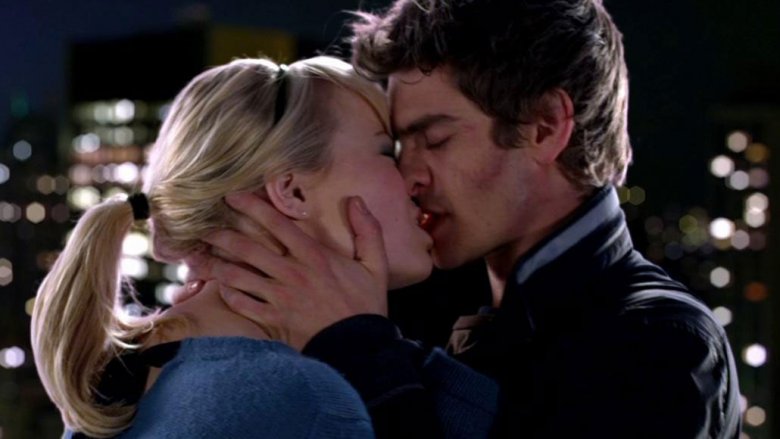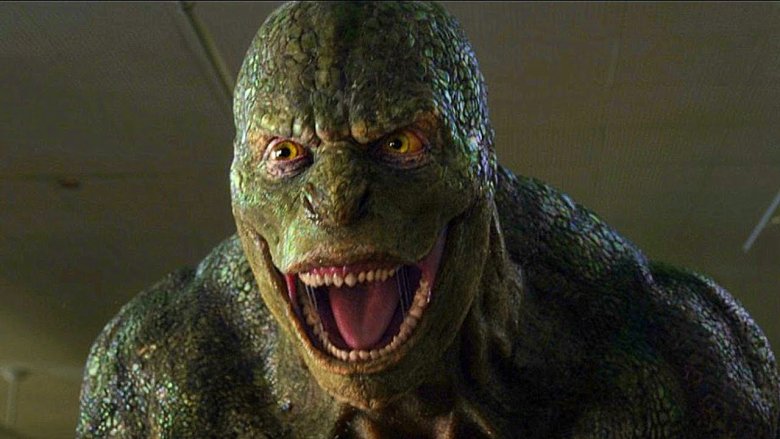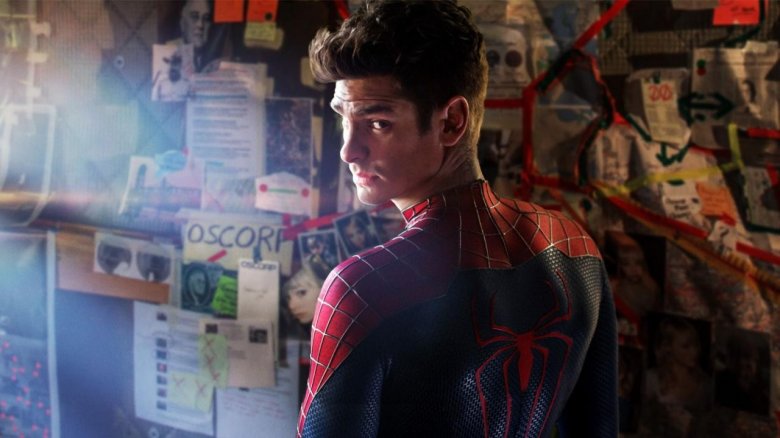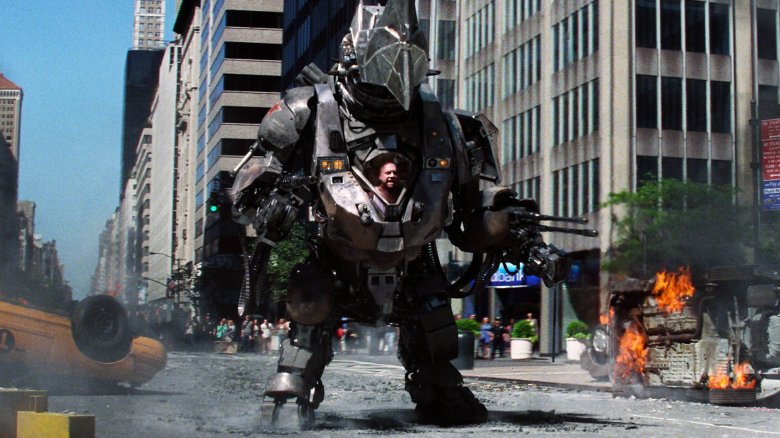5 Best And 5 Worst Things About The Amazing Spider-Man Movies
Tom Holland is the world's most recent Spider-Man, and audiences are falling in love. A fresh-faced high school student who likes to build LEGO Death Star models in his spare time, this Peter is a sweet-natured nerd who just wants to goof off with his best friend Ned, tell Zendaya's acerbic MJ how he feels, and save a few few old ladies from getting run over by garbage trucks. As far as Spider-Men go, Holland is definitely putting his own spin on the web-slinging do-gooder, but he's also sticking closely to the script. And boy howdy, are audiences familiar with Spider-Man's script.
Tobey Maguire's Spider-Man cleared the way for modern superhero mania, of course, and he managed to crank out Spider-Man 2, a true classic of the superhero genre. Now Holland's Spidey is on top, ready to take on the mantle of MCU leadership. But between these two depictions, there was Andrew Garfield's Peter Parker, star of The Amazing Spider-Man and The Amazing Spider-Man 2. Despite the fact that the second film premiered a mere five years ago, these movies are already fading from memory. Why did they fail? What did they accomplish? There are answers to both of these questions, and we're here to unearth them by taking a look at the absolute best and worst things about The Amazing Spider-Man duology.
Best: The chemistry between Emma Stone and Andrew Garfield
Gwen Stacy is famous for being dead. She doesn't loom quite as largely over Spider-Man's psyche as Uncle Ben does, but she comes mightily close. She's Peter's lost innocence, the hapless bystander caught up in the superheroic slaughter, the girlfriend too sweet and pure to belong to Peter's supervillain-riddled world. Before her reinvention as Spider-Gwen, that was the entire point of the character: to be good and then to be dead.
Audiences knew this heading into the Amazing Spider-Man reboot. And in the hands of a lesser team, Peter and Gwen's romance might have progressed along a rote path to destruction. The shock of Gwen's death is gone, so what was left? A lot, it turns out, when portrayed by Andrew Garfield and Emma Stone. The actors (who were also an off-screen couple until 2015) brought a tenderness to the doomed pair, sweet and earnest enough to make an audience forget the parting they were headed towards ... until it finally came and was rendered all the more tragic. For two movies, Peter and Emma got to be young lovers against a world of mutated lizard-men, electricity-manipulating revenge-seekers, and radioactive spiders. In so doing, they became the heart of the Amazing Spider-Man reboot.
Worst: Rehashing Spider-Man's origin story
Batman loses his parents in a darkened alleyway. Superman is sent to our world from the far reaches of outer space. Spider-Man watches his uncle die from violence he could have prevented. These origin stories are etched into our culture, to the point where even someone who's never picked up a comic book is likely to know them by now. They are, as some comics scholars have argued, our modern myths, retold to highlight values, lessons, and models of heroism.
But there isn't just one myth about Zeus, Ra, or Odin. So why, then, must we be subjected again and again to the origin stories of our most popular heroes? The Amazing Spider-Man brought in Peter's parents to add a little variety to their version, but still, audiences had to see Peter give in to selfishness, watch Uncle Ben die, and vow to remain responsible with his newfound abilities forevermore. Perhaps if the movie hadn't come a scant few years after the Sam Raimi trilogy ended, this would have grated less ... but it didn't, and audiences yawned where they should have been on the edge of their seats. The MCU took this lesson to heart, introducing an already bereaved and spider-bitten Peter in the midst of Captain America: Civil War, then plunking him right into the superheroics in Spider-Man: Homecoming. A myth is beloved for its familiarity, but they do need to have a fresh spin put on them now and again.
Best: Spidey's sarcastic sense of humor
Marvel movies have made a zippy, sarcastic sense of humor practically a given for superheroes. But it wasn't always like this. In fact, Spider-Man used to be uniquely marked by his quickness with a quip. He was the wisecracking upstart to the self-serious Captain America, the aloof Doctor Strange, and the Shakespearean Thor of pre-Ragnarok days. Spidey was younger, without the resources of godly realms, billion-dollar businesses, or arcane magic. Smarts and silliness were what he had to work with, aside from the wall-crawling and web-slinging — and oh, how he worked with them. Generations laughed along with Spidey and made his jocular spirit as much a part of his canon as the web-patterned suit.
Tobey Maguire's Spider-Man could joke with the best of them, but for the most part, he kept the clever wit to himself. His Peter Parker was softer, a yearning underdog with more time for big-eyed pining than biting remarks. Garfield's Spidey, in contrast, was an absolute jokester. "You found my weakness," he moans, as a foe pulls out a switchblade, "it's small knives!" In the midst of the otherwise more serious-minded Amazing Spider-Man movies, these remarks dazzled like diamonds in the rough. Here was a Peter with a greater degree of control over his world, who wasn't just saving it, but having fun doing it. It was the shot in the arm the character needed, and it remains a delight to watch.
Worst: Bringing in Peter's parents
Like many superheroes, Peter Parker is an orphan. Importantly, however, that doesn't really matter that much to him. Yes, it's sad, and various arcs and storylines have brought the fact of his parents' deaths to the fore, but his mom and dad have never loomed as largely over his story as his aunt and uncle do. Ben's death is the one that shakes him, and May is the parent that keeps him on the straight and narrow.
Foolishly, The Amazing Spider-Man series attempted to change this formula up. The first movie opens with the intriguing disappearance on Peter's parents, and the subsequent suggestion that they were involved in high-level secrets and experimentation. Peter's parents weren't just relevant to the story. They became critical parts of it, rife with mystery and sci-fi potential. But the blunt fact of Peter's origins overwhelmed any plot point that might have been made interesting. People don't love Spider-Man because of his secret ties to the cutting-edge and powerful. They love him because he's just a kid from Queens who caught the world's luckiest (or perhaps unluckiest?) break. He could have been anybody, even the reader, and therein lies his charm. Giving him a legendary lineage only dims his appeal, and makes him more of an off-brand Superman than a first-line hero in his own right.
Best: The Amazing Spider-Man movies remember that Peter is a science whiz
It's hard to remember now, but the decision to make Peter Parker's web-shooters an organic part of his powers was a very controversial change on the part of Sam Raimi. Most viewers probably didn't notice, but it said something very specific about the early-2000s Spider-Man: He was smart, but he wasn't an engineer. Sure, you saw him in high-level college classes, and yeah, he geeked out with Norman Osborn over research papers. But where the original Spider-Man designed and built his web-shooters, including the webbing itself, this Spider-Man was able to spray the stuff out of his wrists.
Garfield's Peter returns to the comics' original vision in this regard. His web shooters and web fluid are of his own design, and they cement the fact of his intelligence in a way that the viewer can't ignore. Now, Peter is an active inventor, able to translate his knowledge into unique and useful tech as part of on ongoing quest to learn more about his powers and their place in the world. This puts him in line with Marvel heroes like super-genius Tony Stark, while also emphasizing what makes him unique: He has to build things at the desk in his bedroom, out of spare parts. He doesn't have Tony's laboratory or the billionaire's deep, deep pockets. Instead, Garfield's Peter is resourceful, endearingly scrappy, and undaunted by his limitations. The scientific method is as much a part of his skill set as his ability to wall-crawl.
Worst: The movies got so dramatic they became silly
On the one hand, The Amazing-Spider-Man movies were smart to take certain things more seriously. The romance was soulful, even central. Dr. Connors, the villainous Lizard, defended Peter's safety when a fellow prisoner expressed ill intent. Gwen's father was the obstacle that stands between his daughter and Peter's growing affection, but the end of the first movie cements that his hesitation came from a place of love and reasonable concern. All of these moments were born from a firm desire to take superheroes seriously, and they remain some of the strongest parts of these films.
But sometimes this dire tone failed and failed hard. Superheroes can be vehicles for tremendous stories of heroism, failure, longing, and sacrifice ... but they are also full of men who turn themselves into lizards, teenagers who dress in technicolor long johns, and exploding pumpkin-shaped hand grenades. This goofiness is as much a part of the genre as its wealth of tear-jerking origins, and neglecting the silliness can make a movie awkward.
Take Gwen's death, for instance. It is, without question, one of the most famous tragedies in superhero history, and The Amazing Spider-Man 2 mostly gets it right. But in animating Peter's last, desperate web-sling as a hand reaching out to grasp her, it oversteps, becoming way too dramatic and something truly ridiculous. Garfield does his best to save the moment with his heart-wrenching grief, but the image of those web-fingers lingers on. Superheroes can be serious, but never at the expense of their flamboyant roots.
Best: The Amazing Spider-Man movies take superheroes seriously
Sam Raimi's Spider-Man trilogy is full of color, precise adaptations of comic book looks (take a look at J.K. Simmons' J. Jonah Jameson next to some original art of the character), and broad moments of comedy, humor, and yearning. There are moments of fear and sadness, but the dominant emotion is one of wonder. The audience is meant to be swept away by the gloriously broad strokes of it all, and yeah, it totally works. It's a bright and beautiful dream, and the Marvel Spidey films are following suit with high school hijinks and wise-cracking artificial intelligence.
The Amazing Spider-Man duology is a bit different in tone. Sure, Peter is quick with a joke, the scenes of him swinging past skyscrapers are marvelous as ever, and men turn into lizards in terrible cases of science-gone-wrong. But there's a tonal shift to it that underlies the humor and adventure, a willingness to take emotions more seriously. This is most evidenced by Gwen and Peter's relationship, but it can be seen as well in Peter's deep-seated wrestling with the concept of heroism. Garfield has remarked that his portrayal of Peter was one he considered deeply and very much within the context of history's greatest stories. That consideration shows through both movies, and in the age of the one-liner-packed MCU, it's a refreshing aspect indeed.
Worst: A lack of interesting villains
Superhero movies have been struggling to create interesting villains for as long as they've been made. The successes have become iconic — nobody will be forgetting Heath Ledger's Joker or Michael B. Jordan's Killmonger anytime soon — but they have, historically, been few and far between. Before the most recent phase of the MCU brought Zemo, Thanos, and the Grandmaster into the mix, it was the criticism most commonly laid at the studio's door. A good guy needs a bad guy, and a bad guy needs a personality.
Spider-Man movies have fared notably better than other cape flicks. Willem Dafoe and Alfred Molina brought laughing lunacy and genuine heartbreak to the Raimi trilogy, and Tom Holland's Spidey has faced down particularly interesting iterations of the Vulture and Mysterio. But when it comes to Garfield's web-slinger, the antagonists weren't exactly all that charismatic. Dr. Connors' Lizard, a baddie pulled between good-hearted scientific pursuit and a growing, experiment-fueled madness, fell largely flat in the first film. Electro, imagined by the second film as a disgruntled middleman, was even less impressive. This was villainy of the most rote sort, fading well into the background when compared to the films' investment in its romance and special effects. Though many superhero movies have survived lackluster bad guys, they need to be overcompensating in some other department to remain a solid success. By the time the mediocre Amazing Spider-Man 2 rolled around, it wasn't firing on enough cylinders to distract from its so-so psychopaths.
Best: Spectacular special effects
The visual splendor showcased in Sam Raimi's Spider-Man movies might be less impressive when compared to contemporary effects, but there's no denying the splash they made. Watching Spider-Man swing through the shining streets of Manhattan was a breathtaking achievement in superhero cinema and a high-water mark for computer graphics as a whole. The way Dr. Octopus' arms moved as they reached out to throttle Spider-Man! The battle atop the train full of screaming passengers! It wasn't just exciting — it was movie magic in its purest form.
One might have guessed its successor couldn't meet that bar. But somehow, The Amazing Spider-Man movies did just that. Much of what the filmmakers achieved had been mapped out by the Raimi trilogy, of course, but they built upon this strong foundation in fabulous new ways. And if you want to talk about memorable, let's talk about the moment where a line of construction cranes are moved to allow Peter a straight path to swing through. It's a perfect marriage of storytelling and visual invention. Momentum thunders visibly through Peter, the city glitters like spilled treasure, and the construction cranes loom like the hands of a friendly god. It is epic in the truest sense, gorgeous without going overboard, and it symbolizes exactly what Spider-Man means to the people he protects. It comes as close to perfection as any superhero movie moment can.
Worst: The Amazing Spider-Man movies tried to fit in too much
Avengers: Endgame has basically ruled the world since its April 2019 premiere, and it's no wonder as to why. In just one movie, audiences were deluged with Norse gods, interstellar warlords, time travel, valkyries atop winged steeds, quantum physics, and a scene full of 1970s leisure suits. It's an absolute extravaganza of superheroics, overstuffed to the point of absurdity. And the world loved it. In short order, it became a cultural landmark, a milestone of the genre, and the undisputed king of the international zeitgeist.
But Endgame pulled that off because there were dozens of movies preceding it. None of the characters or concepts just mentioned were new to those who'd watched Marvel movies beforehand. Pym Particles, Asgardian thrones, and super-serum were all known quantities. The Amazing Spider-Man movies, especially the second, tried to pull off a similar feat ... but without the necessary preparation. The Amazing Spider-Man 2 packed in baddies, love interests, and plot points by the barrelful: Felicia Hardy, Electro, the Rhino, Gwen Stacy's death, Harry Osborn's Green Goblin, Alistair Smythe, and the Gentleman were all wedged into 142 packed minutes. There was nowhere for the viewer's attention to linger, no mood able to dominate. And as a result, the movie was a mess. In trying to do everything, The Amazing Spider-Man 2 managed to do nothing.
